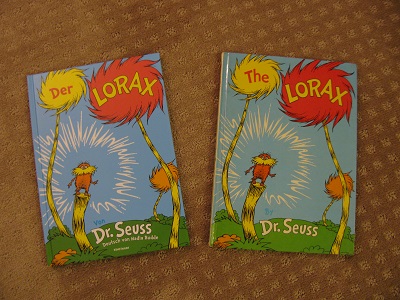Sonderling Sunday – You Need a Schnauch!
It’s time for Sonderling Sunday, that time of the week when I play with language by looking at the German translation of children’s books.
This week, I’m going to dive back into Der Lorax, von Dr. Seuss! Last time, we left off when the Einstler had just seen die Bäume! Die Trüffelabäume!
And here’s where we can see how Dr. Seuss’s use of made-up words actually makes a rhyming translation easier:
“And, under the trees, I saw Brown Bar-ba-loots
frisking about in their Bar-ba-loot suits
as they played in the shade and ate Truffula Fruits.”
= Im Schatten der Bäume sah ich Braunfelliwullis.
Die hüpften in ihren Braunfellipullis
auf puscheligen Braunfellifüßen
und naschten von den Trüffelanüssen.
(“In the shadow of the trees saw I Brown-felli-wullis.
They hopped in their Brown-felli-pullovers
on puscheligen [?] Brown-felli-feet
and nibbled on the Truffula nuts.”)
As suspected, kräusligen is also made-up, from sich kräuseln, “to ripple.”
“From the rippulous pond
came the comfortable sound
of the Humming-Fish humming
while splashing around.”
= Vom kräusligen Teich
stieg ein wohliger Klang,
wo der Summerfisch summte
und planschte und sang.
Oh, alas! The first two lines of this are lovely, but the next two lines? Well, it’s a noble effort, but the German lines don’t have the same rhythm as the original.
“But those trees! Those trees!
Those Truffula Trees!
All my life I’d been searching
for trees such as these.”
Doch die Bäume! Diese Bäume!
Die Trüffelabäume!
Mein ganzes Leben lang wünschte ich mir
Bäume wie diese,
nun standen sie hier.
Really, it’s a challenge to translate rhymes like these:
“The touch of their tufts
was much softer than silk.
And they had the sweet smell
of fresh butterfly milk.”
= Der Tuff dieser Bäume,
zu meinem Entzücken,
glänzte so seidig
wie Schmetterlingsrücken.
(“The tufts of these trees
to my delight,
shone so silky
as butterfly backs.”)
(Notice they didn’t even attempt butterfly milk!)
And it just feels like we’re losing something:
“In no time at all, I had built a small shop.
Then I chopped down a Truffula Tree with one chop.
And with great skillful skill and with great speedy speed,
I took the soft tuft. And I knitted a Thneed!”
= Am Mittag war alles schon ausgepackt,
ein Laden gebaut und ein Baum abgehackt.
Und schneller als schnell, den geschickt war ich auch:
Aus dem kuschligen Tuff strickte ich einen Schnauch.
(“By noon was everything already unpacked,
a shop built and a tree hacked down.
And faster than fast, skillful was I also:
From the cuddly tuft knitted I a Schnauch.”)
I like this page:
“The instant I’d finished, I heard a ga-Zump!
I looked.
I saw something pop out of the stump
of the tree I’d chopped down. It was sort of a man.
Describe him?… That’s hard. I don’t know if I can.”
= Und grad war ich fertig, da machte es plumpf!
ich schaute
und sah, etwas sprang aus dem Stumpf —
aus dem Baum, den ich fällte. Es war so ein Mann.
Ihn beschreiben? Ich weiß nicht, ob ich das kann.
The schimpfte und schnauzte line here makes up for a lot:
“He was shortish. And oldish.
And brownish. And mossy.
And he spoke with a voice
that was sharpish and bossy.”
= Er war kurz, braun und ältlich
und oben bemoost.
Er schimpfte und schnauzte
und machte auf Boss.
(“He was short, brown, and elderly
and over be-mossed.
He grumbled and snarled
and acted the boss.”)
They don’t do badly with this classic line:
“I speak for the trees, for the trees have no tongues.”
= Ich sprech’ für die Bäume, den die können’s ja nicht.
(“I speak for the trees, for they cannot.”)
And I do like the Thneed description:
“I’m being quite useful. This thing is a Thneed.
A Thneed’s a Fine-Something-That-All-People-Need!
It’s a shirt. It’s a sock. It’s a glove. It’s a hat.
But it has other uses. Yes, far beyond that.
You can use it for carpets. For pillows! For sheets!
Or curtains! Or covers for bicycle seats!”
= Ich mache mich nützlich. Dieses Ding is ein Schnauch.
Und ein Schnauch ist etwas, was jedermann braucht.
Man nimmt ihn als Pulli, als Socke, als Kragen.
Ein Schnauch ist sehr praktisch, sozusagen.
Er geht auch als Teppich und Nackenstütze,
als Vorhang, als Kissen oder Fahrradsitzmütze.
(“I’m making myself useful. This thing is a Schnauch.
And a Schnauch is something, that all people need.
One takes it as a pullover, as a sock, as a collar.
A Thneed is very practical, so to speak.
It goes also as a carpet and neck-rest,
as a curtain, as a cushion or bicycle-seat-cap.”)
And I’ll finish off with some words with far too much truth:
“I laughed at the Lorax, “You poor stupid guy!
You never can tell what some people will buy.”
= Ich lachte: Du Dummkopf, jetzt hör auf zu schnaufen!
Man weiß eben nie, was die Leute so kaufen.
That’s it for this week! In general, the translator, Nadia Budde, did come up with lines that still roll off the tongue.

